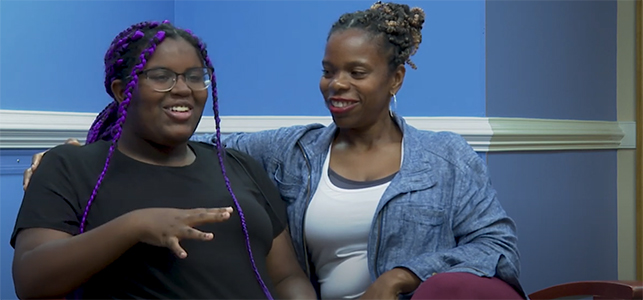
When 14-year-old Gloria grabbed the mail and handed it to her mom, she had no idea it would be a defining moment in both of their lives. In the stack of mail that day was a postcard about TEENS, a 4-month behavioral weight management program for adolescents ages 12-16 and a parent. Instead of setting it aside, Gloria’s mom, Sandra, took note and proposed the idea of participating in the program to her daughter.
“We decided to register for TEENS because we were both looking for a change,” said Sandra. “I was 250-plus pounds and I was noticing my daughter was starting to take after me. I didn’t want her to do that. I thought this was a great way to have a resource to reach out to and get knowledge from.”
Often teens are unsure if a program like TEENS is right for them.
“It is completely normal to feel ambivalent about starting something new,” said Dr. Melanie Bean, principal investigator of the TEENS trial. “We find that, after coming to our orientation and learning more about the program, teens are comforted knowing they will be participating with other teens. We work with each family to help them make the choice that is right for them.”
TEENS is a National Institutes of Health funded research program studying how best to involve parents in their teens’ weight loss journey and long-term maintenance. Enrollees participate in group sessions weekly for four months. They also receive a YMCA membership and participate in a cooking class – all at no cost to families. Families come back for up to a year for assessments, or data collection visits. These assessments help the team know what is working – or not working – so they can continue to improve these programs in the future. They partner with participants to answer important questions to advance science.
“TEENS has a set protocol that is based on best practices, but we individualize the program for each person. In this way, families select their own personal strategies based on what is important for them, to help them meet their health goals,” said Sarah Farthing, exercise physiologist and TEENS program coordinator. “We really try to meet families where they are.”
The comprehensive TEENS team – including dietitians, behavior coaches, medical providers and exercise specialists – personalizes the program for each family.
Gloria was on board when she learned there was plenty of flexibility and no judgment or rigid expectations. By participating in the way that worked best for her, she’s improved her physical and mental health – and her volleyball game to boot.
“Before I started, I was really bad at volleyball. I was slow. I was clumsy. After starting TEENS I’m getting faster, so it’s helped my physical ability for sports,” said Gloria.
Sandra has noticed Gloria is less self-conscious too, which is a huge win from her perspective as a mom. Since Sandra participated along with her daughter, her health has improved dramatically as well.
“I’ve lost almost 100 pounds. I run 9-12 miles every other day. I don’t have the pain in my feet. I don’t have the pain in my back. I don’t get the headaches. It’s been great for me,” Sandra recounted.
TEENS also prompted a tighter bond between the already close duo.
“We’ve always been really close, but we’re cooking together, grocery shopping together, counting calories together. We keep an eye out for each other. We go to the gym together,” added Sandra.
They’re also able to do all the things they love without feeling like weight is a limitation. Their favorites include cosplay, water parks, camping, fishing, volunteering and going to the beach.
TEENS participants not only receive health benefits for themselves, but they’re informing the team and the greater scientific community about the most effective ways of helping families in the future.
“By the end of the study, we will have partnered with 210 families in central Virginia,” said Bean. “Together, we are answering important questions about the role of parents in their teen’s weight management – so that we can advance this field and offer effective treatments not only here at CHoR, but also nationally. Each one of our families is so important to reach this goal. When the study is over, our participants will be the first ones to learn about the results – even before the scientific community.”
“When families come back for assessments, that’s just as important as participating in the weekly sessions,” added Sarah. “That’s what helps us understand what’s working best so we can continue to help families moving forward.”